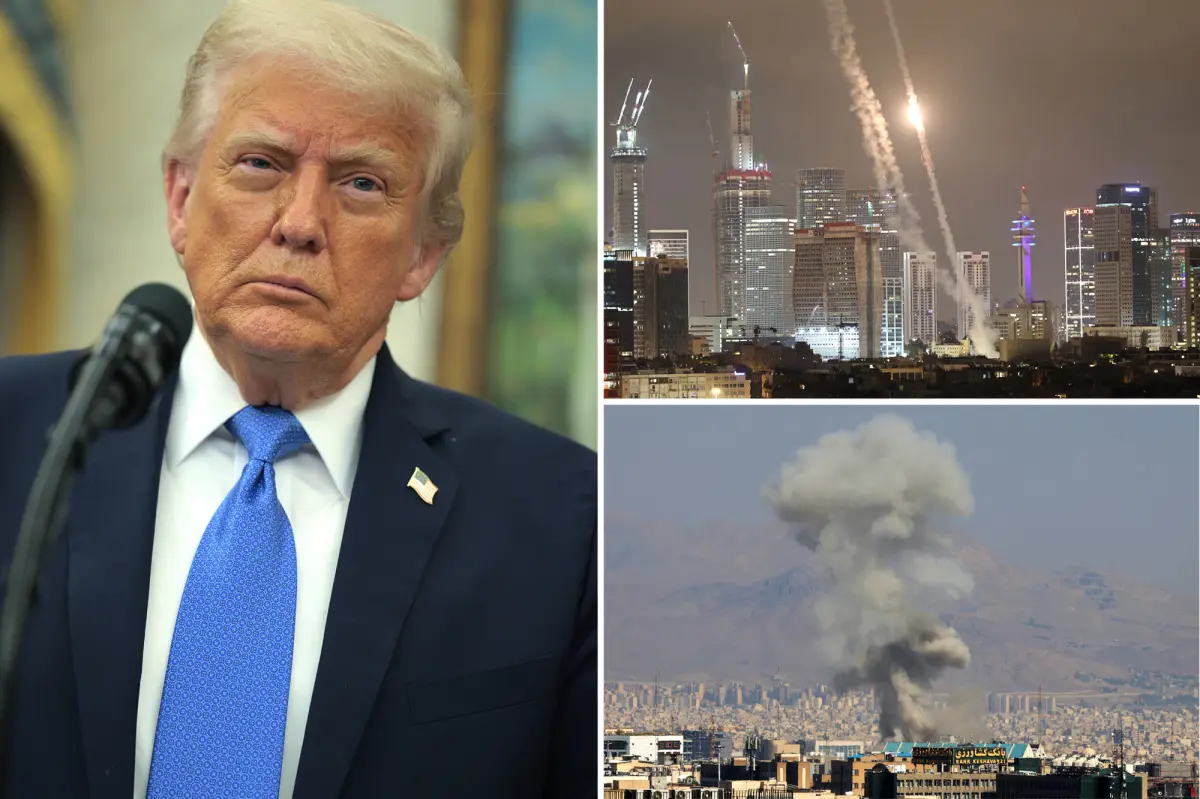The ongoing hostilities between Iran and Israel have entered their fifth day, claiming hundreds of lives and raising fears of a wider regional war. Amid intensifying violence and global pressure for de-escalation, U.S. President Donald Trump has firmly rejected calls for a ceasefire.
Speaking aboard Air Force One, Trump emphasised, “We’re looking at better than a ceasefire… A real end. Not a ceasefire. An end,” according to the BBC. He reaffirmed the U.S. stance that Iran must not be allowed to acquire nuclear weapons and hinted that diplomatic channels might still be explored, possibly involving Vice President JD Vance or Middle East envoy Steve Witkoff.
Meanwhile, Trump flatly denied French President Emmanuel Macron’s claim that the U.S. proposed a ceasefire during the G7 summit. On Truth Social, he wrote, “Wrong! He has no idea why I am now on my way to Washington, but it certainly has nothing to do with a Cease Fire. Much bigger than that.”
A CBS journalist quoted Trump further: “You’re going to find out over the next two days. You’re going to find out. Nobody’s slowed up so far.” Politico later reported that Trump was seeking a “complete give up” of Iran’s nuclear program, stating, “Simply stated, IRAN CAN NOT HAVE A NUCLEAR WEAPON. I said it over and over again! Everyone should immediately evacuate Tehran!”
Israel Kills Iran’s Top Military Commander
As military confrontations intensify, Israel has announced the killing of Iran’s wartime Chief of Staff, General Ali Shadmani, in an overnight airstrike in Tehran. According to the Israeli military, the operation targeted a staffed command center and eliminated Shadmani, described as the closest military figure to Supreme Leader Ayatollah Ali Khamenei.
The IDF stated that Shadmani had commanded both the Islamic Revolutionary Guard Corps and the Iranian Armed Forces. The strike was described as a “sudden opportunity,” highlighting the high stakes and rapid developments in the conflict.
Civilian Casualties Mount Across Iran
Iran’s Embassy in New Delhi reported that at least 224 civilians — including women and children — have died, and 1,257 have been injured in Israeli attacks. The Embassy condemned Israel’s actions, accusing the “Zionist regime” of targeting civilian areas including hospitals, residential buildings, and public infrastructure.
“Contrary to the claims of Zionist regime, they deliberately target residential buildings, hospitals, research centers and civilian public infrastructures,” read an official press release.
The Embassy described the strikes as “blatant acts of aggression” and a violation of international law. Referring to Article 2(4) and Article 51 of the UN Charter, the statement said, “Iran reserves its legitimate and legal rights to respond properly and timely to these aggressions.”
Iran Launches Retaliatory Strikes; Sirens Sound Across Israel
On Tuesday morning, Iran responded with a fresh wave of missile and drone strikes. Explosions and air defense activity were reported over Tehran, Natanz, and Kashan, where three people were killed and four injured, according to Iranian state media. Sirens rang out in Tel Aviv, prompting civilians to rush to shelters, although Israeli emergency services reported no casualties in the latest wave.
Global Reactions and Evacuations Begin
As the death toll rises — with Iran confirming 224 fatalities and Israel reporting 24 — international leaders are scrambling to prevent further escalation. The G7 summit in Canada addressed the crisis, with Macron claiming the U.S. had proposed a ceasefire — a statement quickly rejected by Trump.
G7 nations voiced support for Israel and accused Iran of fueling instability in the region. China has urged its citizens to leave Israel immediately due to worsening security conditions, as Israeli airspace remains shut.
Several European nations have started evacuating citizens. Slovakia organised a flight carrying 73 evacuees, including 25 Slovak nationals and family members of diplomats, arriving safely in Bratislava. Czech authorities also confirmed a plane carrying 66 evacuees had landed near Prague. Slovak Foreign Minister Juraj Blanar confirmed that additional flights are being arranged in coordination with neighboring countries.
Hungary’s Foreign Minister Peter Szijjarto expressed gratitude for the assistance, while the Czech Defence Ministry confirmed that further evacuations are underway.
Iran Seeks Regional Mediation
Iran has reached out to regional players like Oman, Qatar, and Saudi Arabia, urging them to convince Washington to rein in Israeli aggression. Iranian Foreign Minister Abbas Araghchi posted on X, “If President Trump is genuine about diplomacy and interested in stopping this war, next steps are consequential. Israel must halt its aggression, and absent a total cessation of military aggression against us, our responses will continue.”
As both nations escalate their military campaigns, the world watches anxiously — with diplomacy hanging in the balance and the possibility of a broader war looming.


